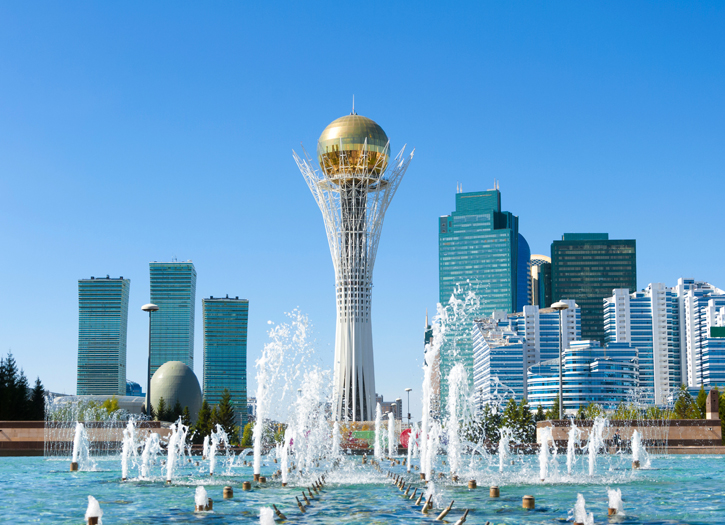The virus was confirmed to have reached Kazakhstan on 13 March 2020. It involved two Kazakh citizens in Almaty who were recently returned from Germany. That same day, two more cases were confirmed with one female arriving from Italy in Nur-Sultan and the other from Germany in Almaty as well. On 19 March, a quarantine was placed on the cities of Nur-Sultan and Almaty where the highest cases were occurring. On 30 March, Atyrau and 5 cities in Karaganda Region were under a lockdown.
On 15 March, President of Kazakhstan introduced a state of emergency throughout the Republic of Kazakhstan for the period from 8:00 a.m. of 16 March until 7:00 a.m. of 15 April. By 16 March, the number of cases increased by seven, making the total at the time nine, two in Almaty and seven in Nur-Sultan. On 24 March, for the first time, three cases were confirmed in Shymkent by a man who arrived on 20 March from Nur-Sultan by a passenger bus and in Zhambyl by a man who arrived from Kyrgyzstan, and in North Kazakhstan by a woman who arrived from Russia. Kazakhstan has spent $13 billion on pandemic response amounting to more than 8 percent of GDP.
From 1 March, the Ministry of Health introduced the fourth stage of strengthening. Travelers arrival from category 1a countries were placed in quarantine for 14 days, and under medical supervision for 10 days. People arriving from category 1b countries were placed in home quarantine for 14 days. By the decision of the sanitary service, these arrivals could be quarantined in a medical facility. People arriving from countries of the second category were under medical supervision at home for 14 days.Others who arrived from countries of the third category were remotely monitored for 24 days.
In order to prevent the spread of coronavirus in the territory of Pavlodar region, it was decided to strengthen the existing sanitary and anti-epidemic measures and introduce additional measures. Nine roadblocks were put up around the entire perimeter of the region, residents were restricted from leaving apartments and houses after 22:00, except for going to pharmacies and grocery stores within the radius of their residence, to work and cases of seeking medical help, the disinfection and anti-epidemic regime was strengthened, including public transport, crowded places, shops, shopping centers and houses, residential buildings, and at bus stops.
The total cost of anti-crisis measures amounted to over 4 trillion tenge. These expenses were provided at the expense of the state budget in the amount of 2.1 trillion tenge, attraction of funds for infrastructure bonds, guaranteed transfer from the National Fund for 1.8 trillion tenge.
To support businessmen whose financial situation worsened due to the state of emergency, the government of Kazakhstan provided an exemption from payment of taxes until 31 December 2020 which were: property tax for legal entities and individual entrepreneurs at large retail facilities, trade entertainment centers, cinemas, theaters, exhibitions, and fitness and sports facilities, land tax on agricultural lands of agricultural producers, individual income tax of individual entrepreneurs working in the generally established taxation procedure.
President Tokayev also suspended interest on unfulfilled tax liabilities until 15 August 2020 and postponed the deadline for submitting tax reports for the third quarter of 2020.Working citizens of Kazakhstan who lost income during a state of emergency due to being forced to leave their jobs without pay received financial support from the state social insurance fund. The amount of social benefits per employee amounted to 42.5 thousand tenge per month.
On 31 March, President Tokayev on-air spoke about additional opportunities to support the public and businesses in connection with the state of emergency, including an indication of pensions and general benefits, including targeted social assistance, providing coverage with additional social benefits by 10% in annual terms, extend the list of categories of citizens who were supposed to be provided with free grocery and household sets from 1 April to 1 July, supporting farmers to timely carry out spring field work, and provide work around large quarantined cities for small and medium business for 6 months.The postal service suspended international mail to many countries.







Add Comment
You must be logged in to post a comment.